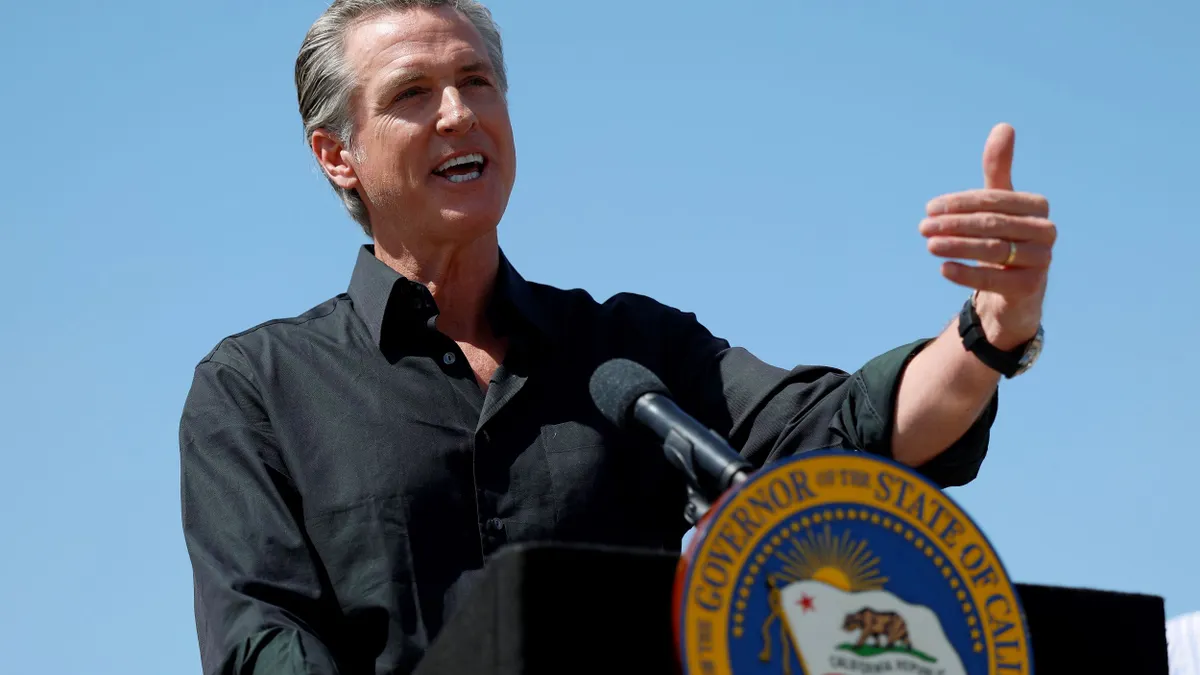Dive Brief:
- California Gov. Gavin Newsom last week signed into law a CPA pathways bill (AB 1175) which establishes an alternative route to getting a certified public accountant license that doesn’t require 150 hours of college credit — which typically equals five years of post-secondary education.
- Under the state’s new licensing requirements, set to take effect on Jan. 1 2027, CPA candidates must earn a bachelor’s with an accounting concentration, pass the Uniform CPA Exam and complete two years of general accounting experience, according to the California Society of CPAs. Alternatively, a qualifying master’s degree can be substituted for one year of experience or an approved accounting certificate program can be substituted for six months of experience.
- “Authored by Assemblymember Jacqui Irwin, sponsored by the California Board of Accountancy, and supported by CalCPA, this landmark legislation keeps the three Es — Education, Exam and Experience — in place while creating new flexibility,” a post on the CalCPA LinkedIn account states. “The update replaces the one-size-fits-all 150-unit rule with multiple pathways that add flexibility, reduce cost, and increase access, while preserving the high standards that define our profession.”
Dive Insight:
California brings to 22 the number of states that have put new laws on their books providing alternative routes for obtaining a CPA license that do not include 150 college credit hours — a requirement that has been seen by critics as a contributor to the accounting shortage.
By year’s end, Massachusetts and New Jersey are among other states that are considered likely to put similar CPA pathways legislation on the books, which would bring the total number with the new laws from the current 22 closer to the half-way mark by year’s end.
Robert J. Pawlewicz, an assistant accounting professor at the University of Richmond’s Robins School of Business, said in an email Monday he’s monitoring both Massachusetts and New Jersey, both of which have active CPA pathway bills which he still expects to pass in 2025. He’s also keeping an eye on state legislatures in Michigan, New Hampshire and Wisconsin as those three states or their CPA societies have said they planned to create CPA Pathways legislation in 2025.
For now New York’s law is in a holding pattern. It gained legislative approval in June but the legislature’s website that tracks the state’s legislation indicates it still awaits the signature of Gov. Kathy Hochul. A spokesperson for the governor’s press office said Hochul “will review the legislation” but did not respond to a question regarding the timing for that step.
Pawlewicz is also keeping an eye on how the public accounting firms are responding to the CPA pathways changes. For example, one Big 4 accounting firm has indicated to incoming associates that the firm intends to “hold them to meeting the 150-credit hour requirement until May 2027,” Pawlewicz said. “Other firms have been silent or encouraging incoming associates to pursue their license however is possible to them.”
Due to California’s being such a large state, the bill has been closely watched by advocates of the licensing policy initiative because the state’s laws have may help boost the momentum of the licensing changes. California’s new legislation will also change the requirements that out-of-state CPAs need to meet to allow them to practice in the state, CFO Dive previously reported.
The 22 states that have passed legislation to date are: Ohio, Virginia, Utah, Indiana, New Mexico, Iowa, Texas, Georgia, South Carolina, Tennessee, Minnesota, Montana, Oregon, Nevada, Hawaii, Alaska, Illinois, Connecticut, North Carolina, Pennsylvania, Delaware and now California.
Keep up with CPA licensure changes with CFO Dive’s tracker on the topic here.
Editor’s note: This story has been updated with a comment from New York Gov. Kathy Hochul’s press office on the status of the state’s CPA legislation.















